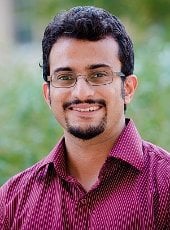Aneet Narendranath

Contact
- dnaneet@mtu.edu
- 906-487-3019
- R. L. Smith 929
- Teaching Professor, Mechanical and Aerospace Engineering
- PhD, Mechanical Engineering-Engineering Mechanics, Michigan Technological University
- MS, Mechanical Engineering, Michigan Technological University
- BE, Mechanical Engineering, Visvesvaraya Technological University
Biography
Aneet Narendranath is a teaching professor in Mechanical and Aerospace Engineering at Michigan Technological University. He received his Master's degree and PhD in Mechanical Engineering-Engineering Mechanics at Michigan Technological University in 2009 and 2013, respectively. His doctoral dissertation was titled "Influence of Mechanical and Thermal Boundary Conditions on Stabilizing/Destabilizing Mechanisms in Evaporating Liquid Films."
Dr. Narendranath's research career spans multiple domains, with a focus on computational methods. He has worked in quantum mechanics, molecular dynamics, combustion chemical kinetic simulations, simulating evaporating liquid films in microgravity, and pulsating heat pipe technology.
More recently Dr. Narendranath has diversified his research portfolio by branching into quantitative and qualitative discourse analysis. In addition to traditional engineering physics research, he now develops open-source models for dictionary-based metadiscourse analysis, large language model frameworks to assess professional communication, lexical network methods for topic modeling, and applies statistical hypothesis testing.
Dr. Narendranath's teaching experience is diverse and includes both traditional lecture-based courses and unique design-studio type courses. Invariably, he introduces metacognitive strategies, active learning, and applies a blended learning environment in all courses he instructs. His teaching has received positive reviews signified by his quadruple nomination, as a finalist, for "R. L. Smith Teacher of the year" and induction into the Dean's Teaching Showcase. His research efforts have borne fruit through peer-reviewed publications and external collaborative, cross-national grants from the NSF and the ASEE.
Links of Interest
Pedagogic Interests
- Blended learning approach.
- Flipped-classroom for active learning.
- Collaborative learning.
Research Interests
- Quantitative and qualitative discourse analysis.
- Numerical solutions and applications to engineering of non-linear partial differential equations
- Low Reynolds Number fluid physics